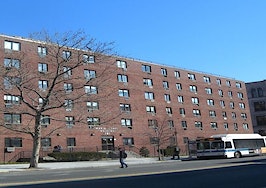Lew Sichelman is a seasoned writer with 50 years of covering the housing and mortgage markets under his belt. His biweekly Inman column publishes on Tuesdays.
Against a background of “phenomenal demographics” and an end of rising mortgage rates, the Mortgage Banking Association expects the housing market to remain strong for “at least the next five years” — and maybe even longer.
“The economic backdrop is quite favorable,” the group’s chief economist, Mike Fratantoni, told reporters at the MBA’s annual mid-October convention in Washington.
Fratantoni’s forecast is that loan costs will peak at 5.1 percent by next year’s second quarter and remain at that level for the foreseeable future, at least through 2021. According to Freddie Mac, rates now average 4.9 percent, so if he’s on target, the recent run up has just about run its course.
The economist thinks the Federal Reserve Board will boost the short-term federal funds rate one more time this year and three times next year. But he is betting that long terms rates — i.e., the 30-year fixed rate mortgage — won’t rise too much higher.
“Actually, the Fed is still actively trying to stimulate the economy,” he said. But in an effort to keep inflation at bay, he added, the central bank “may shift from neutral into slow-down mode. But I don’t think long-term rates will move nearly as much.”
Rates will be low enough to drive existing home sales from 5.4 million this year to 5.6 million in 2019, 5.7 million in 2020 and 5.8 million in 2021, Fratantoni predicted. Add in smaller gains in new home sales — from 641,000 in 2018 to 664,000 next year, 682,000 in 2020 and 699,000 in 2021 — and the immediate future, indeed, looks bright.
“It’s not a case of (poor) demand,” the economist told an overflow crowd during a convention session. “It’s a supply problem that won’t be solved soon.” Even at that, though, he is calling for a steady rise in single-family housing starts, from 888,000 this year to 983,000 in 2021, a jump of nearly 100,000 units.
Driving these gains is a more sustainable rate of job growth, wage growth that is trending higher and a generation of young adults that is “just now hitting their peak homebuying years,” he told the group.
His big worry: That the spread between BBB corporate bonds and the 10-year Treasury yield will increase. “We don’t need much of a jump in credit spreads” for the economy to wobble into recession, he warned. “Housing won’t cause a recession but this might.”
Fratantoni is expecting job growth to fall back from an average of 208,000 a month so far this year to 120,000 next year.
“We need only 100,000 (new jobs a month) to keep going on an even keel,” he pointed out. But he also noted that job openings are at “a record high of 7.1 million,” largely because businesses can’t find the trained workers they need.
The unemployment rate, meanwhile, is at the lowest point since 1969. And the economist expects it to fall a bit further, from 3.9 percent so far this year to 3.5 percent next year.
At the same time, both wage growth and median household incomes are trending higher. The median family income is now $61,372, an increase of nearly $7,000 from $54,569 in 2012.
Moreover, millennials are “just at the edge” of reaching their prime home buying years — ages 25 to 40. Standing at the precipice are 47 million of them, the economist said, adding that they are “a tremendous support for housing demand.”
Actually, he said during the press briefing, the number of first-time buyers is already rising, from just 1.2 million in 2011 to 2.1 million in 2017. That’s nearly the same number as in 1999 (2.3 million).
“Demand is there, mortgage rates will go up but not too much, the economy is strong and housing starts are gaining steam,” Fratantoni said. “This is what’s driving home buying.”
A few other key favorable trends the economist mentioned:
- The number of houses selling above list price is slowing, with many more houses now selling below their asking price. “We’re definitely seeing price deceleration, from 6 percent appreciation on a national basis to 4 percent in the last three months, giving incomes a chance to catch up,” he said. “Deceleration is even greater” in the high-flying California markets, where price increases have fallen from 9 percent annually to just 2 percent now.
- Slowing appreciation is another sign of moderating house prices. “Prices ran way ahead of earnings for too long,” he said.
- Origination of purchase money loans will rise steadily through the next three years while refinance lending will dip next year and then begin taking a larger share of the pie.
- Mortgages used to buy property will total $1.18 trillion this year and increase to $1.24 trillion next year, $1.27 trillion in 2020 and $1.31 trillion in 2021. Refi lending, meanwhile, will end the year at $451 billion and sag to $395 billion in 2019. Then it will begin rising again to $410 billion in 2020 and $432 billion in 2021.
- One reason for the anticipated increase in refi activity is the fact that homeowners are sitting on a pot fill of money. “Existing home owners are in a fantastic position,” Fratantoni said. “Home equity has risen beyond previous peaks.”
The pot of green — or gold, if you will — is up from $13,418 on average in 2006 to $15,190 today.
Lew Sichelman’s weekly column, “The Housing Scene,” is syndicated to newspapers throughout the country.







